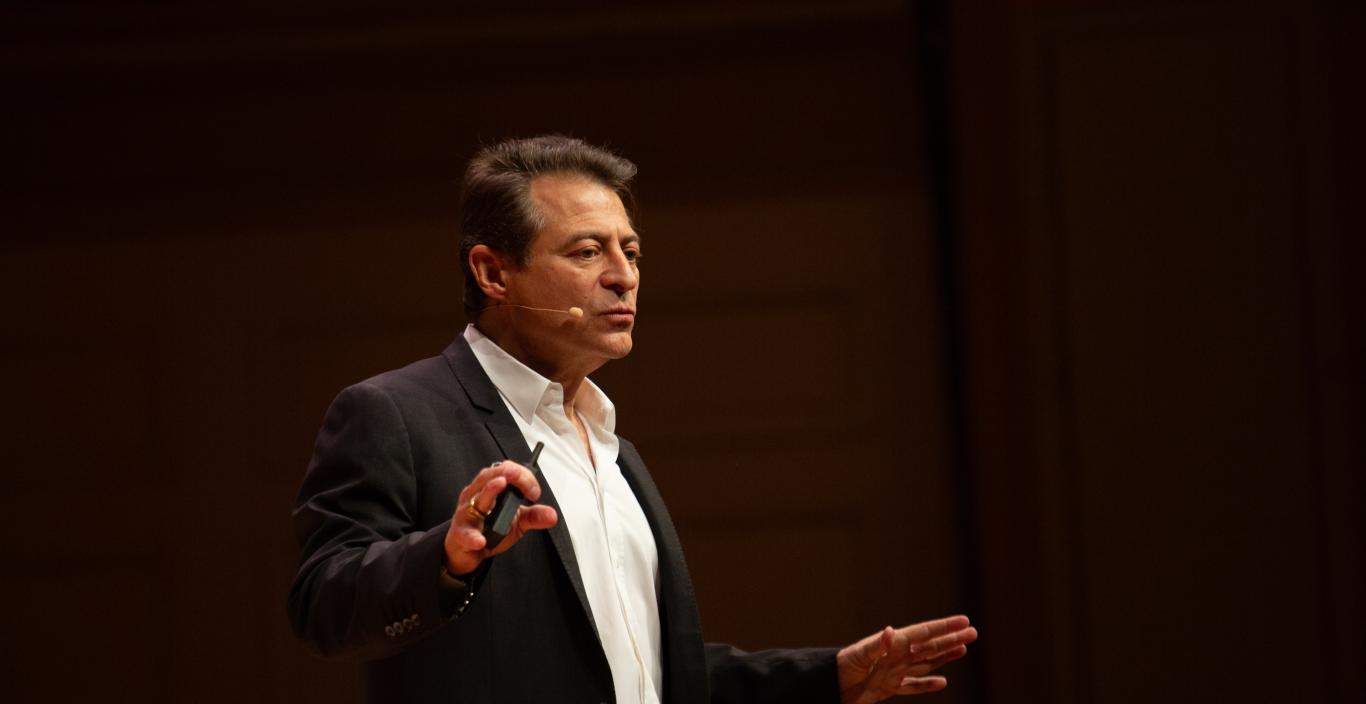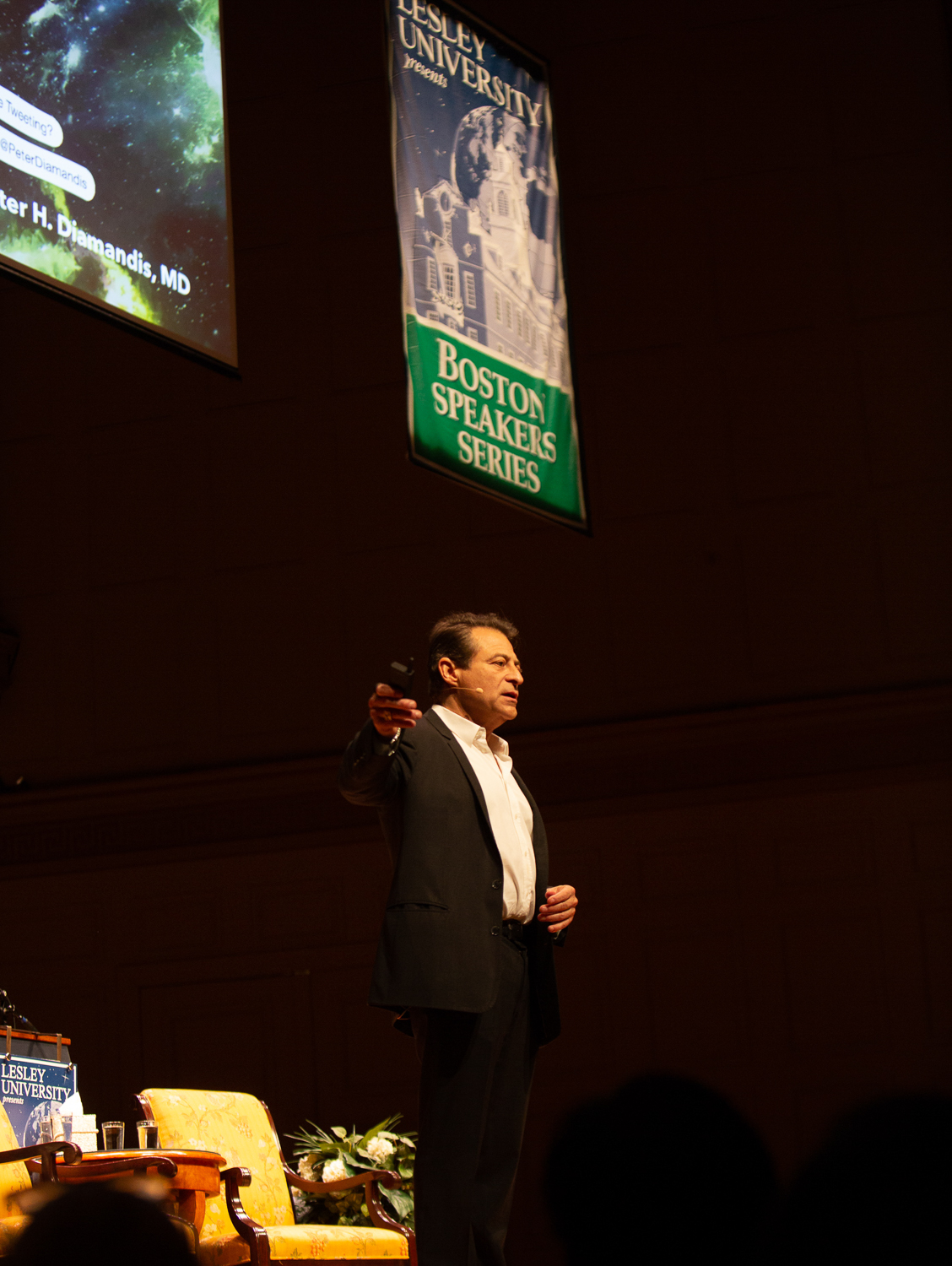While others fear the “rise of the machines” in a future dystopian hellscape, XPRIZE founder and high-tech venture capitalist Peter Diamandis is cheered by the growth of human reliance on artificial intelligence (AI) and the prospect of ubiquitous autonomous cars — many of them airborne — figuratively and literally right around the corner.
“People have no idea how fast things are changing,” said Diamandis to a rapt audience in Symphony Hall for the fifth evening of our 2019-20 Boston Speakers Series.
Diamandis revealed that about six years ago he had a microscopic biometric device implanted in his hand, which his wife likened to a dog’s tracking chip. Still, he embraced the comparison as betokening a coming age of human/computer hybrids enjoying unheard-of improvements in mobility, eyesight and cognitive function.
Already, Diamandis said, scientists are growing human vital organs and, in a matter of just a few years, transplant patients can receive their own “spare” livers, kidneys and hearts, rather than having to “wait until someone else dies.”
The futurist, speaking in front of a colorful, multimedia presentation, showed how a brain synched with a machine is helping a paralyzed man direct the movements of his robot exoskeleton, giving him the power to take steps again.
Another patient, a blind woman, can now see by virtue of glasses that electronically send images to her brain via sensors that bypass her nonfunctional eyes.
Even the everyday “disease” of growing old can be reversed, or at least ameliorated, using implantable computers that slow the progress of the “stem-cell exhaustion” that comes when one hits their 30s, explained Diamandis.
“We’re so naïve about what’s going on inside our bodies,” he said, indicating that our reactive medical establishment won’t compare to savvy patients, assisted by AI, treating themselves at home. Even surgery can be done better by computers and robots, he said.
“We don’t have health care in the United States,” he sneered with a smile. “We have ‘sick care.’”
Innovation = abundance
Diamandis pointed out that the human organism has evolved in a linear fashion, over 30,000 years of a relatively halting pace of innovation. In contrast, the last century — spring-boarding off the foundation of the Industrial Revolution — saw the creation of transistors, computer chips, microchips and every expanding computer memory at bargain prices. Similarly, Diamandis said, the world has moved from horse-drawn buggies to fossil-fuel-powered combustion engines, to electric cars, to self-driving cars to flying self-driving cars, which will be commercially available within the decade.
Over the same period of time, human beings who relied on coal mined from the ground began drilling for oil, then began unlocking natural gas from the earth via fracking, to developing batteries and other fuel cells for electricity and, at last, solar energy is in reach for only pennies per kilowatt-hour.
Diamandis averred, the earth will soon become reliant on cheap solar energy, which will lift even more people out of poverty.
“The poorest countries are the sunniest countries in the world,” Diamandis said. “They’ll be the world’s energy exporters.”
Consumer technology, such as 5G connectivity and satellite-enabled networks, in the next five years will spread over the earth “like kudzu,” the prolific and recalcitrant vine, giving mobile device service to even the most remote areas of the planet.
These trends are evidence, he said, that people are evolving “globally and exponentially,” rather than in the linear fashion of the past.
Potential challenges
But even for someone so optimistic about the future, Diamandis acknowledged the downsides of an AI-centric world. Industrial innovations typically displace workers, though only temporarily, as workers acquire new skills and employment directly related to those innovations (such as monitoring and operating the robots that build cars). However, such transference of workplace readiness isn’t guaranteed, especially with the pace of modern innovation.
In addition, Diamandis acknowledges that the human capacity to mine and meld with the promise of AI might be ahead of our capacity to ethically enjoy those developments. As people converse more online and less face-to-face, depression grows and a sense of real human connection wanes.
He also conceded that the rise of personal tech precedes the decline of personal privacy.






